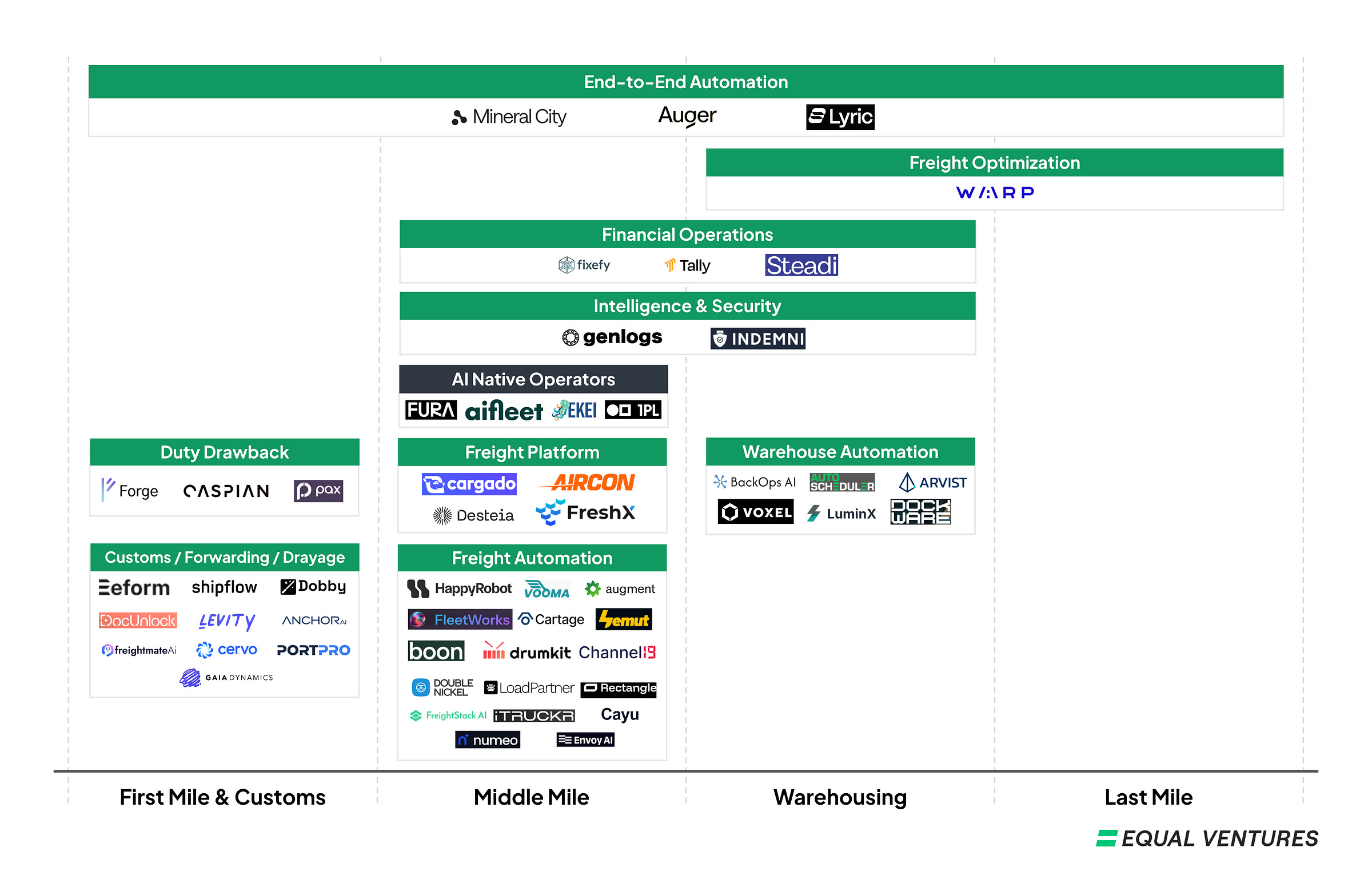Logistics x AI | The First Wave of Gen AI
The AI innovators transforming the U.S. logistics sector
Follow the discussion on Linkedin
The global Logistics sector is a $10 trillion industry that touches everything we consume, yet much of it still runs on a fragmented set of disjointed legacy systems. The transportation infrastructure that enables goods to get from producers to consumers and powers the global economy is overdue for transformation.
For decades, innovation in this complex space focused on data, visibility, and middleware. Now, a new wave of AI-native startups is reimagining the value chain from the ground up. AI is beginning to change how physical goods are sourced, procured, stored, routed, and delivered.
At Equal, we’ve been investing in companies developing purpose-built technology for logistics, retail, and supply chain since our start. We’re extremely excited about the opportunities that AI-native platforms can bring to the space and drive meaningful operating leverage to a space where SaaS 1.0 often fell short.
Against a backdrop of rising inflation, geopolitical uncertainty, margin pressure, and demand volatility, we’ve heard from many supply chain operators that they are searching for solutions that truly move the needle on cost, margin, and/or operational efficiency.
To map out the latest set of startups in the industry, we’ve mapped out the landscape of companies founded post-2020 applying AI to the logistics stack and driving transformation in the sector.
Mapping the Logistics AI Market
To understand where innovation is happening, we’ve mapped the current landscape of startups that are harnessing AI to reimagine the supply chain. Given the interconnectivity of logistics, many solutions target brokers first, before quickly expanding into carriers, shippers, or other industry stakeholders. This interdependency means that it makes sense to map the market along the steps of the logistics journey: as goods are produced, shipped, stored, and delivered to end customers.

First Mile & Customs: We’re seeing a new wave of companies emerge, ranging from those automating workflows for freight forwarders (Shipflow, Dobby), customs brokers (DocUnlock), and drayage (PortPro). One of the areas where we’ve seen a particularly high concentration of innovation is around duty drawbacks, with numerous players entering the market like Caspian, Pax, and Forge.
Middle Mile: This segment has attracted a particularly large number of entrants as startups look to disrupt the $1 trillion U.S. trucking market. Several companies innovating in this space have leaned on an initial wedge feature like automated calling (with voice AI) or automated email workflows to gain an initial footing, with the intent of expanding into a more comprehensive set of AI-enabled workflows (HappyRobot, Vooma, Boon, FleetWorks). Several others have chosen to focus on the pain points of a subset of companies with similar structures: Cargado aims to unlock cross-border logistics capacity and Augment acts as an AI teammate for mid-market and enterprise customers.
Another emerging type of play we're seeing here are AI-Native Operators – companies that leverage AI tooling themselves to challenge incumbents by offering a similar service better, faster, or cheaper. Fura operates as a digital freight broker; aifleet is a full-stack, AI-driven carrier; and Ekei automates freight booking through order pulls, auto-calculated loads, and live quoting.Warehousing: In speaking with customers in this segment, we’ve heard from many that they desire AI-powered offerings that sit above warehouse management systems (WMS) to sequence tasks and optimize processes across docks, labor, and inventory in real time. Innovators in this space are winning on orchestration and labor-light throughput. Some examples include Tally (revenue management), AutoScheduler (warehouse orchestration), Arvist (automated quality control & compliance), and Voxel (automated workplace safety).
Cross-Supply Chain: Certain new entrants have targeted multiple steps of the supply chain from day 1, stitching workflows end-to-end or centralizing back-office operations. We’re seeing broad “control tower” layers and shared AI-powered back offices that unify scheduling, optimization, security, and finance operations. Some of the companies with end-to-end offerings are Lyric (unified platform for logistics modeling and planning), Auger (automated inventory management), and Mineral City (automated product security and verification).
Although we’re still in the first innings of deployment of AI in the sector, we’re starting to see many early entrants gain steam as industry operators look to transform their own operations. As foundational models improve further, we believe there is a massive opportunity for new upstarts to capture market share and redefine how goods move around the world, decisions are made, and operations are scaled.
Reach out to Equal
As always, if you’re building in this space – or are an operator, advisor, or industry partner eager to work with the next generation of supply chain innovators – we’d love to connect. You can reach our team via email at chelsea@equal.vc or ali@equal.vc.





